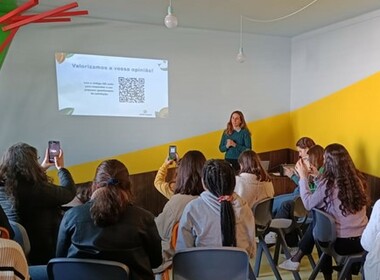As an integral part of several local communities, we have the power to positively influence the lives of the people who make them up, not only through employability, but also through the relationships we establish along the value chain and the social and environmental responsibility programs we develop.

In 2024, we introduced our external social responsibility (CSR) policy in the aim of increasing economic and social value and progress in those territories where we operate, specifically in Portugal and Africa. This step, framed by our Sustainability Agenda 2030, will allow us to be even closer to our communities and to boost the development of initiatives aligned with the purpose and strategy of Sumol Compal and our brands.
To raise the positive impact in the communities where we operate, we have defined three priority intervention areas.

To foster access to balanced nutrition and healthy lifestyles.
We have created Sumol Compal Donations Programme aimed at improving the standard of living of local communities through the donation of food products from our own brands and those we represent. This initiative annually supports over 250 national entities and also reduces food waste by channelling products which are approaching their expiry date but are still totally fit for consumption to associations located in the areas influenced by our facilities.

To foster skills development and equal opportunities
We seek to intervene in local communities by investing in training and strengthening partnerships with schools. The Positive Nutrition projects, targeted at nutrition students at various Portuguese universities, and the partnership with FICASE, which supports the most vulnerable children in Cape Verde, are educational initiatives in which we seek to foster nutritional literacy and promote healthier lifestyles.

To foster more inclusive communities by enhancing cultural diversity and access to employment.
We promote inclusion in our communities by supporting events that enhance the identity and cultural heritage of communities and the engagement of our People in partnerships with local associations.
At the beginning of 2025, we launched the Sumol Compal Volunteer Program, reinforcing our commitment to creating, collaborating, and/or supporting initiatives in the local communities where we operate.
With the mission to contribute to the development of the local communities where we have operations, through the involvement of our People in actions that promote well-being improvement and sustainable development, we outlined a program with three goals:
- Multiply Sumol Compal's values;
- Promote a responsible culture and citizenship;
- Offer the talents and skills of our People in service of the communities.
Our employees have up to eight hours of work per year to participate in community initiatives in the areas of nutrition, hydration, and well-being promoted by the program.
